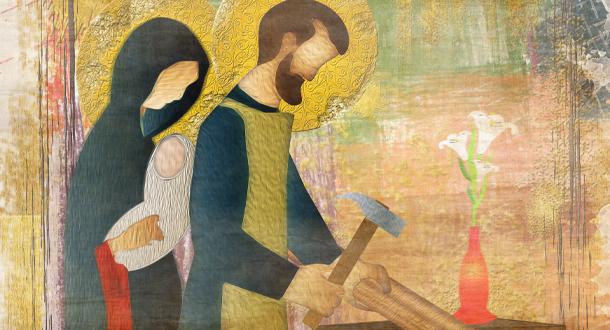
Feast of St. Joseph the Worker
Scripture:
Genesis 1:26-2:3 or Colossians 3:14-15, 17, 23-24
Matthew 13:54-58
Reflection:
In December, Pope Francis declared this liturgical year of 2021 as a special year to honor St. Joseph. In fact, Joseph’s role is so important in our Christian tradition that he is honored on two feasts—March 19, the “Solemnity of Saint Joseph, the Spouse of the Blessed Virgin Mary” and today, May 1, “St. Joseph the Worker.” Both feasts celebrate gospel scenes in which Joseph is mentioned. The infancy narratives of Matthew and Luke point to Joseph’s role as the spouse of Mary. Matthew’s Gospel emphasizes the protective role of Joseph, as he is counseled by a heavenly messenger in a dream to take Mary and the infant Jesus to Egypt, out of the deadly reach of the despot King Herod who seeks to kill the infant as a potential rival to his throne.
Today’s feast reflects another dimension of Joseph. As the gospel selection from Matthew notes, Jesus is known in his hometown of Nazareth as “the carpenter’s son.” The Greek word used here—tekton— literally means a “craftsman,” someone working with wood but perhaps also with stone.
Appropriately the special readings for this feast cite the opening chapter of the book of Genesis, which in majestic poetry describes God’s creation of the world. The segment selected for the first reading today notes the creation of the human being, with the astounding assertion that God made the human being, “male and female” in God’s “own image.” Distinct from all the rest of creation, the human is endowed with self-awareness, a capacity to love, and sharing in God’s own stewardship of the created world.
Awareness of the threats to earth— “our common home” as Pope Francis refers to it in his encyclical on ecology, Laudato Si’—modern biblical scholarship has noted that “dominion” over the created world entrusted to humans by God is probably not the best translation. The responsibility of humans for the development and well-being of the earth should mirror God’s own “dominion”—that is, recognizing its innate goodness and beauty and, therefore, caring for it and not destroying it. Perhaps the English word “stewardship” catches more accurately the meaning of this key passage in Genesis.
It is this God-given commission to care for the earth—to be its “stewards”– that ultimately gives human work a sacred character and confers dignity on those who labor. This feast of St. Joseph the Worker coincides with the celebration of labor that takes place in many countries throughout the world on May 1. Pope Francis again, in his decree inaugurating the year of St. Joseph, noted this connection. In accord with the gospels, it is true to say that Jesus himself was from a “working class” family. From our Catholic and Christian point of view, human labor of all types is to be respected. Working conditions that demean or exploit human labor are unjust and to be condemned.
Because of the ravages of the pandemic, we are aware more than ever today of those who have lost their jobs and families who live in acute poverty and uncertainty about their survival. In the responsorial Psalm 90 for this feast, we earnestly pray: “Lord, give success to the work of our hands.” This feast honoring Joseph the “worker” invites us to pray and to strive for justice on behalf of those who work, particularly those most vulnerable.
Fr. Donald Senior, C.P. is President Emeritus and Professor of New Testament at Catholic Theological Union. He lives at the Passionist residence in the Hyde Park neighborhood of Chicago.
